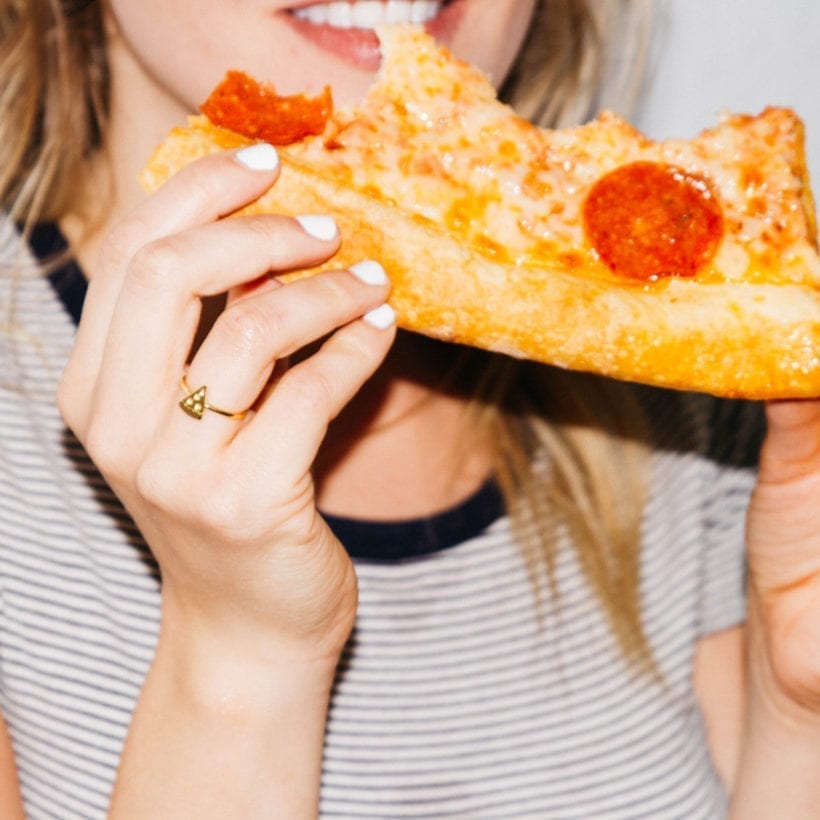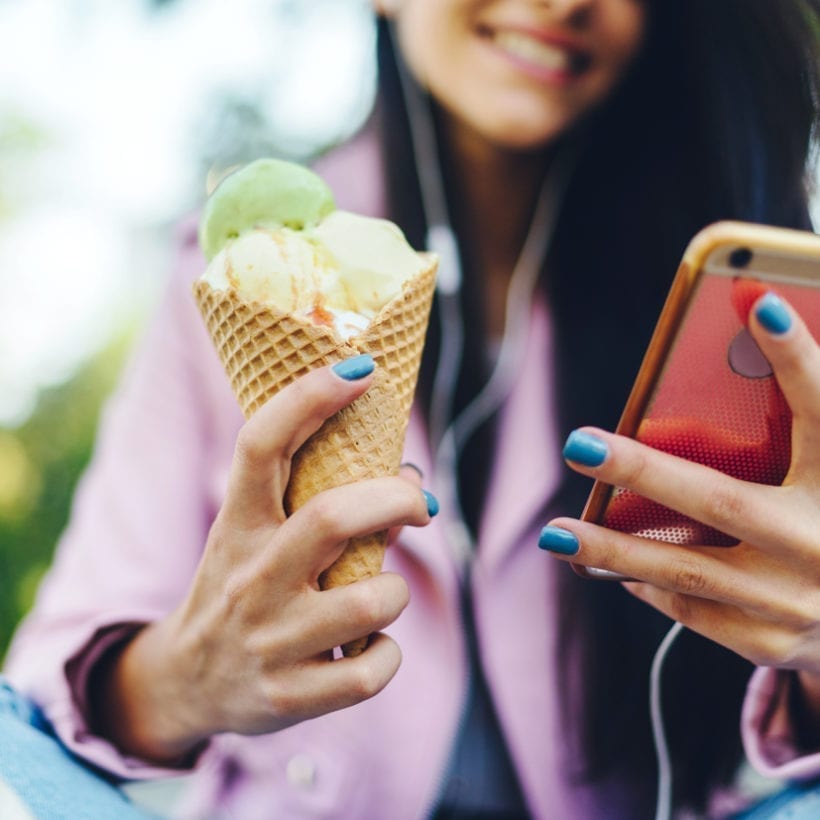Office snacking has become such a part of our work culture that it is not out of the norm to have an entire Slack channel dedicated to what treats show up in the office: the donuts leftover from a morning meeting, the kitchen pantry stocked with an irresistible array of salty snacks, the bowl of M&M’s you reach for out of habit every time you pass reception…
But it is when office snacking becomes mindless and fueled by stress that it becomes problematic. So do not worry, indulging in a cupcake for your coworker’s birthday is nothing to lose sleep over. “Telling ourselves that we ‘shouldn’t’ eat certain foods (like the donuts), actually increases our desire for these foods,” says Alissa Rumsey, R.D., a nutrition therapist and owner of Alissa Rumsey Nutrition and Wellness. In a survey from the American Psychological Association, 38 percent of Americans said they had overeaten or eaten unhealthy foods in the past month because of stress — either because the snacking served as a distraction from the stress or because it had just become a comforting habit.
“I don’t think most people realize that it is happening,” says Yasi Ansari, R.D., a national spokesperson for the Academy of Nutrition and Dietetics. “Food brings feelings of pleasure. In a 9-to-5 job, it’s easy to turn to your desk drawer and grab a snack when wanting to take a mental break.”
Why We Can’t Stop Stress Eating
“During times of stress, a hormonal cascade takes place,” explains Ansari. Stress triggers a rise in cortisol (the stress hormone), which can trip your appetite — specifical cravings for food higher in sugars and fats, she says. “When people eat large amounts of hyper palatable foods — which are mostly foods high in sugar and fat content — it can activate reward centers in the brain. This in turn can become a habit if the body continues to associate food with comfort, especially during times of distress.”
Restriction — either not eating enough food, or not eating enough of the foods you enjoy — can also, ironically, lead to more stress eating. “If you’re playing the mental game of ‘should I or shouldn’t I,’ your brain responds as it would to any type of restriction: by increasing your cravings and desire to eat,” Rumsey says. “The best thing to do is start allowing yourself permission to eat if and when you want to do so — just this small mindset shift can make a huge impact.”
The Fix
Again, it is not the fact that you want to have a slice of cake at a going-away party that is problematic — enjoy the cake — it is when stress snacking turns mindless that it becomes unhealthy.
To start building healthier habits, first figure out what is really going on. “When my clients tell me about stress eating at home or in the office, I start off by asking what is leading them to these eating behaviors,” Ansari says. “Are they getting enough sleep? Are they hydrated? Are they staying active? Getting out of the office? Are they experiencing changes in their day-to-day that are contributing to stress?”
Here are some things you can do to prevent stress eating in the office:
It’s easy to turn to your desk drawer and grab a snack when wanting to take a mental break.
Eat well. It may sound obvious, but both Rumsey and Ansari said many people end up snacking because they are not eating full meals. “If you aren’t eating enough, or if you aren’t eating foods that are satisfying to you, then you’re more prone to snack throughout the day,” Rumsey says. If you are hungry, Ansari adds, “a donut or cookie or bag of candy will not be a balanced meal.”
“When you’re eating healthy meals, it’s easier to spot the difference between physical and psychological hunger,” Ansari says. “Be more mindful of what those physical hunger cues are for you. For example, is it a headache? Maybe fatigue from going 3-4 hours without eating? Or a grumbling in your stomach that you sense when you are physically hungry?” If it is not that and your urge to snack was triggered by seeing a coworker come from the breakroom carrying a treat, that is psychological hunger.
Sleep well. “The less sleep we get, the more our hunger hormones get out of sync,” Ansari explains. “After a good night’s rest, we are more likely to make healthier food choices and be more aware of our hunger cues throughout the day.”
Manage your stress. Instead of reaching for the snack drawer as a coping mechanism when you are really stressed, experts suggest trying to address the stress itself. “Take some time to understand where the stress is coming from and incorporate more activities in the day or after work that allow for you to be more mindful,” says Ansari. “Try meditating, getting a massage, listening to calming music, go on a walk, or simply just pamper yourself in whatever way you feel will help decrease some stress and increase mindfulness.”
Plan ahead. “If you know you want to head for the candy, cookies or donuts at a certain time of day, start stocking up on healthier snacks that help satisfy this craving for you,” Ansari says. If you always get a craving for sweets after lunch, keep dark chocolate covered nuts in your desk instead of heading to the vending machine. “I like to keep whole grain bread and nut butters, popcorn, trail mix with dried fruit and fresh fruit near my desk,” Ansari says.
Practice intuitive eating. One of the best ways you can head off stress snacking is by practicing intuitive eating. The theory is simple: eat whatever you want.
That is not an endorsement for eating leftover breakroom cake all day though, but rather really asking yourself what you want. Is getting the third handful of M&Ms really want you want? “If the answer is yes, go for it,” says Rumsey. “Otherwise, you’ll end up thinking about it for the rest of the day and will likely end up grazing on other snacks to fill up that hole.” But if you know you will feel a little sick after eating more candy, it is easier to skip it.
“It can help to say to yourself, ‘I can have one later if I want to.’ That way, you’re taking the pressure off having to eat now while also releasing any restriction,” Rumsey says. “You’re then able to decide if you really do feel like a donut, or if you’re just eating it because it’s there.”
It can also help to get away from your desk while you eat — it is hard to be mindful of what you are eating if you are multitasking.
A Healthier Approach
In a perfect world, we would all master the principles of intuitive eating and only make food choices we felt stellar about 100 percent of the time. In reality, mindless eating is bound to happen sometimes.
And that is OK — a healthier snacking strategy is not so much about filling your desk drawers with carrots and almonds (though both are great) as is it about getting into better habits. “Make it a priority to set a consistent eating schedule, fill up on high fiber fruits, veggies, grains and a lean protein and after you’ve eaten a well-balanced meal, then treat yourself to a smaller portion of the snacks you find in the office,” says Ansari. “I love finding ways to boost the nutritional profile of the foods that may not be as healthy for you.” Think: Pairing the high fat or sugar foods with a piece of fruit, or a handful of almonds, cashews or walnuts.
And remember, she adds, “It’s OK to treat yourself.”






